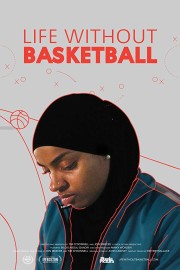Life Without Basketball
“Life Without Basketball” will, inevitably, be compared to Steve James’s landmark hoops documentary, “Hoop Dreams”; Hell, I did as much when I talked to co-director Tim O’Donnell after the screening, only echoing what someone in the audience asked him after the film. The similarities are unmistakable, but so are the differences. O’Donnell and co-director Jon Mercer have their own story to tell, in their own way, and the result is a lovely extension of that film’s look at social issues colliding with sports, not a rehash. Bilqis Abdul-Qaadir deserves as much, and she receives it in this film.
I think I had heard Bilqis’s story in passing over the past few years, but never really paid attention. She was a great high school and college basketball player, setting records and getting some heat for professional ball overseas. She also happens to be Muslim, and it’s when she might get a chance to play internationally that she learns of a restriction that had never really been articulated before. FIBA, the international basketball governing body, had banned players from wearing a hijab during games, for “safety” concerns, although it basically just sounds like garden-variety Islamophobia. As the fight rages on to get the ban lifted, Bilqis tries to find other ways to fill that void like coaching and becoming an advocate, but she still finds herself drawn to the court.
O’Donnell and Mercer’s film, like “Hoop Dreams,” started out as a short film before expanding into a feature. The other main component about it, other than centering around a basketball player, is how it looks at social issues surrounding its subject’s ability to play the game they love as they try to transition into the professional game, along with their family life. Whereas a lot of the issues surrounding the players in “Hoop Dreams” are more unique to the American experience, a systemic failure to serve student-athletes, and an exploitation of the African-American community, the issues Bilqis deal with are more about a general distrust and prejudice against Muslims around the world, although it does fold into the continuing discrimination Muslims feel in America now, which has only gotten more pronounced since Trump’s inauguration.
It’s difficult to have something that meant so much to you taken from you through no fault of your own. It’s a show of your character how you handle that moment. Bilqis struggles plenty emotionally, but she ultimately finds something bigger than herself to give her time and passion to in motivational speaking and coaching other Muslim basketball girls who might benefit after her through her work. There is a moment at the end that may give her the chance she’d waited for for so long, but while the rules may have changed, she still finds that some of those underlying feelings exist in the world. The fight rages on.










